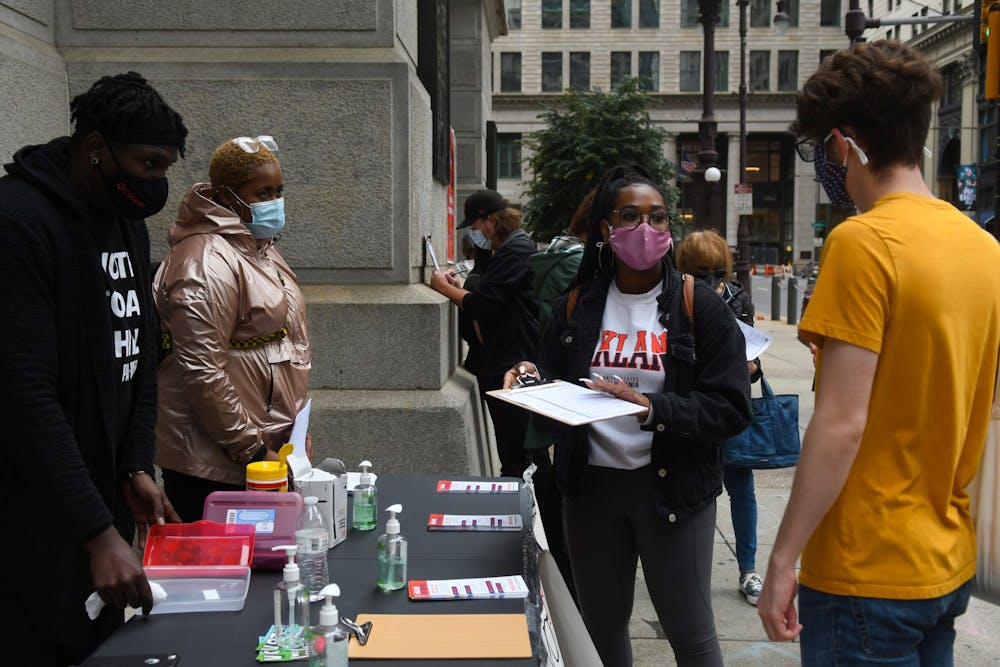For me, the decision to vote for Joe Biden’s presidency was clear. President Donald Trump’s long history of xenophobic policies and remarks speak for themselves. But as I voted, and felt the powerful emotion of participating in my first presidential election, I couldn’t help but also feel frustrated. While I am hopeful in seeing so many of my peers engage in voting efforts this election, I resent the idea that we are civically engaged merely by voting.
The idea that voting every few years qualifies as the end-all of civic duty is facetious. Voting is only one form of civic action, not to mention one that millions are disenfranchised from participating in. As students, every one of us has to make a much larger commitment to consistent civic engagement if we want to see change in our community and hold lawmakers accountable.
It would be insincere to think that systemic problems began and will end with Trump’s administration. It’s unironic that this year — a year filled with radical shifts in the national discourse on race and class — is an election year. If anything, Trump’s crass racism has actually inadvertently forced many previously complacent white liberals to reckon with issues like systemic racism. This reckoning cannot end on Election Day, particularly in white liberal communities.
In the wake of George Floyd’s murder, the former Mayor of Minneapolis Betsy Hodges penned a piece in The New York Times about how she saw white liberals in her community, who despite believing they were doing good, resist systemic change. In the article, Hodges describes how in local meetings white liberals often supported surface level changes that “helped” marginalized communities — such as summer programs for people of color, or funding for assistance hotlines — but they often fought against or ignored policies that could offer systemic change, like altering the public education system or expanding affordable housing in their communities.
In his Letter from a Birmingham Jail, five decades before Trump’s presidency, Martin Luther King Jr. criticized white liberals in a similar vein to Mayor Hodges. King wrote how he was “gravely disappointed with the white moderate,” and he hoped that white moderates would understand that if law and order failed to promote justice, the system becomes “dangerously structured dams that block the flow of social progress.”
This was by no means an encouragement by King not to vote. King was a staunch advocate for voting. Rather this was a message that attempted to remind us to be critical of broken systems and their ability and willingness to solve systemic issues.
While many of my peers tout “I Voted” stickers on social media during election season, it is just as important that these students support organizing efforts on campus and in the Philadelphia community throughout the year. Although not as nationally glamorous, campus efforts to support Philadelphia public education, divest from police, and stand up against ICE, are just as deserving of active participation.
If this summer has shown us anything, it’s that there are many avenues to impact policy and make change. It can be argued that protesting is just as important as voting. Even under the Trump presidency, the wave of protests following the murder of George Floyd, and the collective action of citizens, forced lawmakers to propose legislation on police reform.
RELATED:
Police fatally shoot Black man in West Philadelphia, prompting protests near Penn’s campus
Students, profs., and politicians fear disenfranchisement of voters of color this election
Just because news cycles have shifted from racial injustice to the election cycle, does not mean these issues are close to being solved. Even in 2020, wealthy white parents resist school integration, the net worth of a white family is nearly ten times greater than of a Black family, and people of color are more likely to experience racial discrimination when trying to rent or buy housing. These problems persisted long before Donald Trump ever took office, and will continue to persist if people don't continue to challenge the status quo.
Change never happens on Election Day. It happens in the intermediary moments — in the days, weeks, and years between elections. That is when the continued push for change is necessary. Looking beyond the election, despite the results, we should ask ourselves what we plan to do to continue fighting for the issues that encouraged us to vote in the first place.

UROOBA ABID is a College senior from Long Island, N.Y. studying International Relations. Her email address is uabid@sas.upenn.edu.









